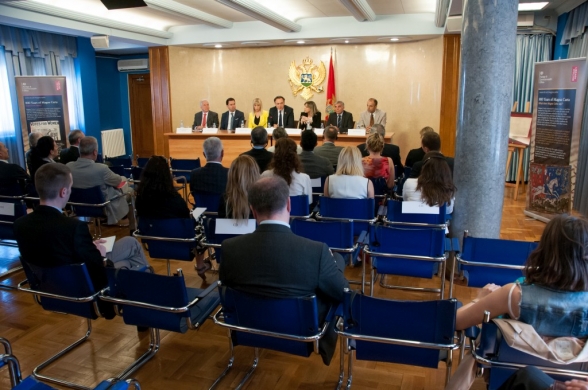The Great Charter of the Liberties was adopted on 15 June 1215 and presents the English constitutional document limiting the power of English kings. The Charter influenced the principles of the English constitutional freedom, but it was also a model for constitutions worldwide.
Upon the invitation, the gathering was attended by representatives of diplomatic corps in Montenegro, representatives of national bodies and institutions, representatives of NGO sector as well as members of the Committee on Political System, Judiciary and Administration of the Parliament of Montenegro.
The conference was opened by MP Ms Snežana Jonica, Deputy Chairperson of the Committee on Political System, Judiciary and Administration, who, in the same time, was a moderator of the gathering. On the occasion, she thanked to the NGO “Civic Alliance” for the initiative for organising today’s conference.
The following spoke at the gathering: Mr Ranko Krivokapić, President of the Parliament of Montenegro, Ms Desanka Lopičić, President of the Constitutional Court of Montenegro, Mr Zoran Pažin, Minister of Justice, Mr Šućko Baković, Protector of Human Rights and Freedoms, H.E. Ian Viting, Ambassador of the Great Britain to Montenegro, and Mr Boris Raonić, President of NGO “Civic Alliance”.
In his address, President of the Parliament of Montenegro Mr Ranko Krivokapić, reminded of the importance that Magna Carta Libertatum had in contemporary constitutional systems even eight centuries after its adoption. On the occasion, he said that in Slavic languages the sense of the constitutions was to limit the power, prevent any misuse and ensures that no interest of an individual or government could be above the constitution. Additionally, he said that the rule of law provided stability and security of every citizen. Finally, he emphasised that only absolute respect of the law and rule of the law resulted in the economic growth and prosperity of every state.
Ms Desanka Lopičić, President of the Constitutional Court of Montenegro, said that Magna Carta Libertatum was a legal and political document, representing the cornerstone of constitutionality, i.e. the legal act at which the modern legal states were built. She added that the said act codified the customary law, in the same timeguaranteeing justice and freedom for all categories of citizens. When it comes to the role of the Constitutional Court, Ms Lopičić said that it fulfilled its responsibilities envisaged by the Constitution, particularly with regard to grounding of European values into domestic legal order and aspiration that the state should be based and built on the principle of the rule of law.
Minister of Justice Mr Zoran Pažin stressed that Magna Carta Libertatum was European and world’s lighthouse of freedom and in the same time British contribution to cultural map of humanity. Also, he said that the rule of law resulted from the obligation of limiting the power, adding that legal security was a fundamental attribute of the rule of law. He underlined that this process was simultaneously followed by the adoption of the appropriate regulations and that England earned the gratitude for the path of modern constitutionalism.
Mr Šućko Baković, Protector of Human Rights and Freedoms, said that Magna Carta Liberatum was a document guaranteeing three key values: life, freedom and dignity, which were universal values. Furthermore, he stressed that in performing his duties, the Ombudsman primarily dealt with protection of rights and freedoms of every citizen, and that he applied legal standards in that part.
H.E. Mr Ian Viting, Ambassador of the Great Britain to Montenegro, reminded of historical aspect of this document, which introduced the principle of equality before the law, i.e. created preconditions were for holding anybody to account. Furthermore, he said that Magna Carta represented a control mechanism and that laws would lose sense if their full application was not enabled.
Mr Boris Raonić, President of the NGO Civic Alliance, referred to aspects of the rule of law in contemporary legal systems, adding that Magna Carta represented a cornerstone of legal state and that a special attention must be devoted to development of culture of human rights, aimed at economic prosperity.
By marking this important date, Montenegro has joined the global action of celebrating “Magna Carta Libertatum”.









